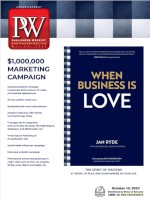MDMA (better known as ecstasy or molly) has long fueled all-night raves, but science journalist Rachel Nuwer (Poached: Inside the Dark World of Wildlife Trafficking) puts the spotlight on the drug’s medical potential in I Feel Love: MDMA and the Quest for Connection in a Fractured World (Bloomsbury, June). The author spoke with PW about MDMA’s promising future as a treatment for trauma, addiction, and depression.
What compelled you to write this book?
I was looking for a new intellectual challenge, but the aspirational reason is: I feel like people can’t really care about things like the planet or even each other if they don’t feel good about themselves first. If people can use MDMA as a therapy to help get over their trauma and have more bandwidth to care about things in the world, maybe we could have a better place for wildlife and nature.
How is the perception of MDMA evolving?
I have a news alert set for MDMA, and it’s a mix of the party stuff and headlines on its therapeutic use. I think that’s starting to come to the forefront of people’s minds. As time goes by, like marijuana, it will come to have a medical connotation. We wanted to get the book out this year because of the impending likely legalization for treating PTSD with MDMA. But it’s okay if it’s used at parties, too. It isn’t an either-or situation. My editor and I had a conversation early on, and he said I needed to think of MDMA as the main character. What would the important elements of its story be? I think that’s every facet of MDMA’s use.
How has writing this book changed your thinking?
One of the revelations I had is how prevalent traumatic experiences are. We are all carrying around our own traumas from childhood, small or large, and it wasn’t something I considered before. It’s made me more sympathetic and compassionate when dealing with people and thinking about where they are coming from.
What do you hope readers will take away?
I hope people just come to it with an open mind. I didn’t write it for heavy MDMA users or novice users or nonusers. It’s really for everybody—if you like history, if you like culture, if you like politics, if you like people. One thing that’s been eye-opening for me are all these stories coming out about people whom I wouldn’t assume have tried it. It’s more present than people realize.



 Volume 270
Issue 21
05/22/2023
Volume 270
Issue 21
05/22/2023





